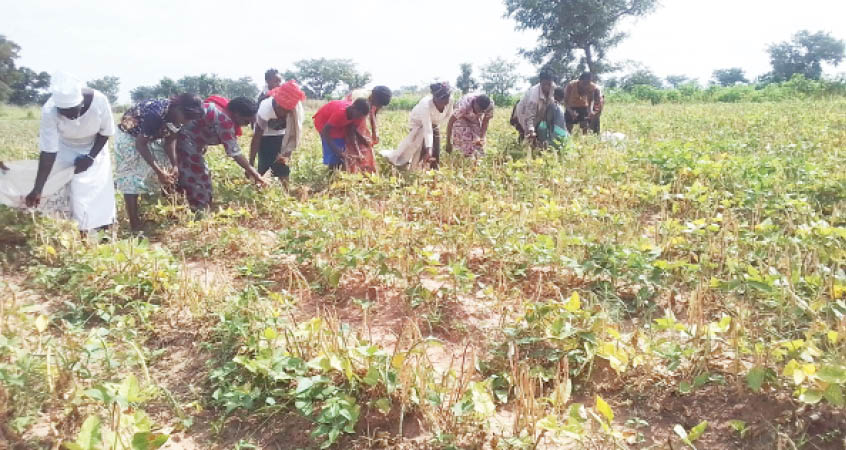Mrs Serah Fagga, a widow, alongside other farmers, in the past four years without any regrets, has delved largely into commercial cowpea farming in Benue State.
Her cowpea farm along Uniagric-Gbajimgba Road in Makurdi produces for both consumption and income generation.
Scientists shifting cowpea farming focus to Benue women
Poor energy: Women processing garri, palm oil face smoke, fire hazards in Benue
Fagga is one among several women in the state who are now cultivating cowpea in large quantity after they discovered the potentials in cowpea production.
She told our correspondent in Makurdi that this year’s cultivation was the first time she noticed pest on her field because the farm wasn’t well sprayed with pesticides as it was done in the previous years when there were no such issues.
Fagga, who was harvesting cowpea alongside other women in one of her fields during the encounter at the weekend, expressed satisfaction with the bountiful yields, even as she thanked scientists from the University of Agriculture for providing the improved seed varieties and tutoring her on best agronomy practices.
“Farming cowpea is lucrative. I encourage women to come out in their numbers to become great cowpea farmers. In years past, we didn’t think of growing cowpea in Benue State. But, now with improved varieties, we are now farming cowpea for commercial purposes in the state,” she said.
Fagga added that apart from earning huge income from cowpea production over the past four years of consistency, she was able to buy a motorcycle as a gift for her uncle after last year’s harvest.
Her field testified to how much the scientists in the College of Agronomy at the Joseph Sarwuan Tarka University Makurdi (JOSTUM) are now shifting focus on cowpea farming to women in Benue State.
Besides the women, youths are also striving to become giants in the production of cowpea in the state.
Some of them – Wasam Kenneth and Dan Ediri – have also been in the business of cowpea production for the past four years and haven’t looked back.
“I have been farming cowpea for the past four years and haven’t regretted it. I planted the FUMPEA 1 and I usually harvest twice in a year. Sometimes, after initial harvest, I spray the field and harvest again; if the weather condition is good, I could harvest thrice in a year,” Ediri said.
Our correspondent reports that plant breeders and agronomists from the institution formerly known as the Federal University of Agriculture, Makurdi (FUAM) developed the FUMPEA 1, 2, 3 & 4 which is highly sought after across the country and beyond.
No doubt, some of these cowpea varieties now in the hands of women farmers in the state have compelled their interest to venture into large scale production.
To this end, Professor of Plant Breeding and Genetics, Lucky Omoigui, who developed the FUMPEA varieties, said the essence of concentrating on the women cowpea farmers in recent times was aimed at empowering them for the betterment of their families and the society.
Omoigui spoke while conducting the Vice Chancellor of JOSTUM on field inspection of the cowpea farms owned by women along Uniagric – Gbajimgba road in Makurdi.
“If you empower a woman, you empower a whole community and the nation at large. The aim of empowering these small holder farmers is what you are seeing here today,” he said.
The plant breeder explained that seven years ago, most farmers in the state toiled so hard only to harvest between three and four bags of cowpea from their fields, in the end, due to the low yield seeds which they planted.
But he further explained that the farmers’ plight made the institution in collaboration with International Institute of Tropical Agriculture (IITA) to develop high yielding varieties of cowpea seeds suitable for the Benue environment.
“We have been able to develop range of varieties that will mitigate against the effect of climate change in this environment.
“I have visited some fields today (weekend) and seen a lot going on. The FUMPEA 1 variety planted here is extra early maturity of between 65 and 70 days,” he added.
He expressed happiness that the university has won the centre of excellence in agricultural value chain and they are going to be working on several commodities which will be a landmark that would change the life of the people in Benue and other catchment areas.
Omoigui posited that the development of the varieties was in line with one of the focuses of the university which is the improvement of agricultural value, adding that the varieties were tested for the environment and pushed into the hands of farmers through the Accelerated Varietal Improvement and Seed Systems in Africa (AVISA) project.
Earlier, an agronomist, Dr Teryima Iorlamen, who bridges the gap between the breeder and the farmers, disclosed that the demand for the FUMPEA varieties were very high by both farmers and consumers even beyond the shores of the country.
Iorlamen posited that, “We are shifting focus to women and youths. This is because when we were developing the seed varieties, women contributed a lot by letting us know the variety that can cook faster. So, we brought them in right from the onset.”
“Prof. Lucky Omoigui is behind the variety we see here. In most of the institutions where people are doing breeding, you will notice that they have developed lots of varieties but those varieties are still on the shelf, they are not in the hands of farmers but we now have a project – AVISA. JOSTUM is participating in that project and the essence of the project is to bridge the gap between the breeder and the farmer. For instance, I’m not a breeder but an agronomist, Madam Fagga is a farmer; so what I do is that I bridge the gap between the breeder and the farmer.
“This is what the project does, so that when the breeders are developing, we take it from them to the farmers and that is how madam happens to have access to these materials and she isn’t the only person who have access to these materials. All the people here have access to the material.
“This year, we have over 2000 farmers in Benue who have access to our materials. We observed that in the past seven years, people have been telling us that cowpea doesn’t do well in Benue and the reason is that we were not breeding materials meant for this environment. But now, we have Prof Lucky and other scientists around who are able to develop materials meant for this environment such that other people who want to use would come and pick it from us.
“There is a variety we call FUMPEA 1 which people from Jigawa State now want to adopt as their variety. Since I have been traveling all over the country, I have never seen a place affected with striga like Jigawa and that is the variety that strives well in Jigawa State.
“I want to announce to you that the demand for FUMPEA 1 in Niger is now more than what we can supply so what we have done has gone very far and not less than one million farmers in Niger are cultivating the cowpea.
“Since a lot of farmers are benefitting, we are trying to shift our focus to women and youths so that we see how women can benefit from what we are doing because when we were cultivating some of these varieties, the women contributed a lot like what they call cooking time and taste, they want to know the variety that takes a shorter time to cook because the price of gas/kerosene keeps skyrocketing. That was why we use to brought them in.
“So, in this campus, a lot of women have some space and they are doing well. They have been working with us and today we thought it well to bring the institution’s number one citizen (Vice Chancellor) to her (Fagga) farm and the foremost breeder, as well as other farmers to to see for themselves.”
Responding, the Acting Vice Chancellor of JOSTUM, Prof. Paul Annnue, commended the efforts of the scientists and promised that the institution would give them support including releasing more land space to continue making the good researches in line with the school’s mandate.
The acting vice chancellor however promised that, “On the issue of insecurity, we will continue to battle it. We will continue to plead with our host community. The other time we came and declared harvest but overnight they came and harvested.
“We will also continue to engage them in meaningful work so that there wouldn’t be idle hands looking for bad things to do. I thank you for the good works you are doing and pleading that this should continue. We have catchment states—Nasarawa, Taraba. Anything we get here, and it gets to neigbouring states, will boost our core mandate.”

 Join Daily Trust WhatsApp Community For Quick Access To News and Happenings Around You.
Join Daily Trust WhatsApp Community For Quick Access To News and Happenings Around You.


